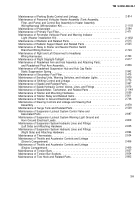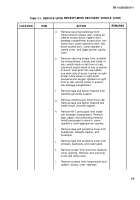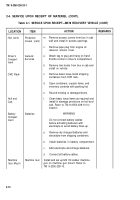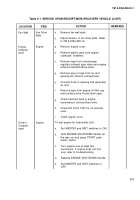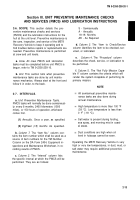TM-9-2350-238-20-1 - Page 41 of 1364
TM 9-2350-238-20-1
(3)
Tightening.
Tighten nuts, bolts,
screws, and other types of fasteners with a
torque wrench to the value listed in the mainte-
nance manual. Do not over tighten; this may
strip threads and break off the part being tight-
ened.
(4)
Repairing.
Repair includes inspect-
ing, cleaning, preserving, adjusting, replacing,
welding, riveting, strengthening, and other tasks
associated with putting parts in working condi-
tion.
(a)
Inspect for burrs, cracks,
nicks.
(b)
Replace bent, broken, or
gouges, or
stripped
bolts, nuts, screws, and washers. Bolts,
screws, and nuts may be loose if rust, chipped
paint, or bare metal is around them. Tighten
loose screws, bolts, and nuts. Replace missing
parts.
(c)
Look for bad welds where chipped
paint, rust, or gaps are present. Have bad
welds repaired.
(d)
Look at electric wires for cracked,
frayed, loose, discolored, or broken insulation.
Replace bad parts and tighten loose clamps
and connectors.
NOTE
When tightening fittings, always hold
fitting adapter with one wrench and
tighten nut with another wrench until
snug. Tighten nut around 1/6-turn to
1/3-turn. If fitting leaks, unscrew nut
a full turn and retighten it. If still leak-
ing, replace leaking parts.
(e)
Look at hose, fluid lines, and tubes
for bends, wear, cracks, or leaks. Replace bad
parts. Make sure all clamps and fittings are
tight. If a fitting leaks, tighten it.
Equipment operation is allowable with
minor leakages (Class I or II). Of
course, you must consider the fluid
capacity in the item/system being
checked/inspected. When in doubt,
notify your supervisor. When operat-
ing with Class I or Class II leaks, con-
tinue to check fluid levels as required
in your PMCS. Class Ill leaks must
be repaired.
NOTE
Fluid leaks affect vehicle status.
Learn the following classes of fluid
leaks for unit PMCS.
Class I-
Seepage of fluid (as indicated by wet-
ness or discoloration) not great enough
to form drops.
Class II- Leakage of fluid great enough to form
drops but not enough to cause drops
to drip from item being checked.
Class Ill-Leakage of fluid great enough to form
drops that fall from the item being
checked. Class Ill leaks should be
reported to your supervisor or direct
support maintenance.
(5)
Corrosion.
Check for signs of deteri-
oration, rust, unusual cracking, softening, swell-
ing, or breaking on entire M578 Recovery Vehi-
cle. Become familiar with the four stages of
corrosion listed below, and take the appropriate
required maintenance action outlined below.
Stage 1-
Red, black, or white corrosion de-
posits on surface with etching or
pitting. However, base metal is
sound.
Stage 2-
Powdered granular or scaled condi-
tion. Base metal is sound.
2-15
Back to Top

